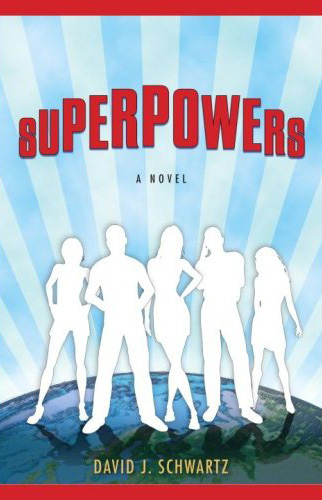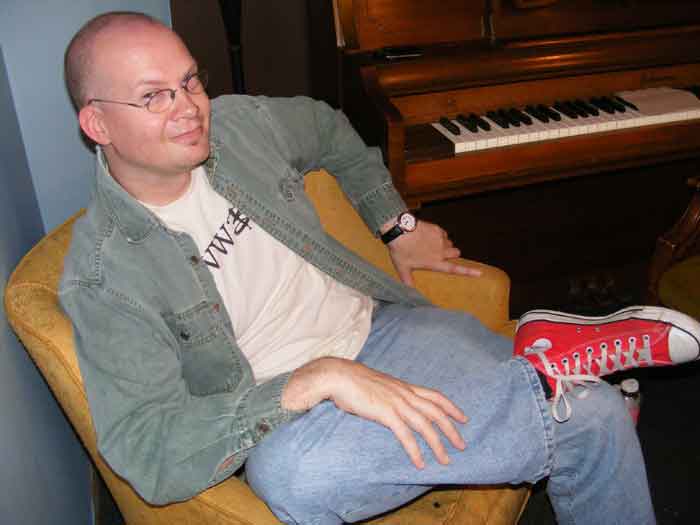LITERATURE: Just Your Everyday Superheroes
Britt Aamodt offers a profile of Twin Cities author-made-good David Schwartz (SUPERPOWERS): they talk about bending pop culture comics conventions, superheroes after 9/11, and why it's not always a good idea to save the day.


AUTHOR DAVID J. SCHWARTZ STEPS FROM THE CORNER of Western and Selby in Saint Paul and heads for Nina’s Coffee Café. Nina’s occupies hallowed ground. Beneath the coffeeshop, at garden-level, Minnesota’s homespun teller of tales, Garrison Keillor, has established that most venerable of American retail institutionsthe independent bookstore. Patrons burble up from the stairwell of Common Good Books, toting hefty sacks, to linger in front of Nina’s. Should they or shouldn’t they splurge on a double caramel macchiato, what with the economy and all? Oh, but they’ve just purchased some nice books, and, you know, a book never reads so well as in a coffee shop.
Schwartz navigates around the deliberating knot of shoppers on the sidewalk, slyly approving the book-filled sacks on their arms. Whiffs of the page-turners and best-sellers shelved below waft up the stairs; all indications that, despite record home foreclosures, a giddily mounting national debt, and two foreign wars, all’s well with the world for the moment. No need for Schwartz to break out his laptop and pocket dictionarytools of the author’s tradeand rescue the nation today. But have no doubt: stories can save lives. As a man of story, Schwartz is likely better aware of that fact than most.
No, today, this Minnesota author can simply kick back, slug an espresso for the writers who came beforeF. Scott Fitzgerald cut his teeth on nearby Summit Avenueand submerge himself in a good book, someone else’s book. He’ll just let his own stories to steep for a while, until he’s ready for them, or they for him.
Yet even as Schwartz, attired in green jacket and red Converse high-tops, climbs to the loft to find a table, his imagination stirs. Threads of plot rise like steam from the mug in his hand. And in spite of his intentions to do otherwise, he has no more sunk in his seat than the laptop appears. Time to write. For Schwartz, it’s always a good time to save the world.
Superpower Me
Schwartz’s latest and super-greatest effort is Superpowers (Three Rivers Press, 2008), a novel about five college students who suddenly find themselves invested with amazing powers the morning after a drinking binge at an end-of-semester party. Unlike their partying peers at the University of Wisconsin-Madison, Jack, Caroline, Harriet, Mary Beth, and Charlie do not wake only to the usual hangovers and empty beer bottles, but also to extraordinary abilities that, within a week, have them suiting up in spandex and calling themselves the Madison All-Stars.
Jack has the power of super speed, Caroline flight, Harriet invisibility, Mary Beth super strength, and Charlie telepathy. They’re super crime fighters in a city beleaguered by
well, criminals, yes, but criminals of the ordinary set. Schwartz’s Madison has little in common with Gotham City or Metropolis. There are no Jokers or Lex Luthors holding the city hostage to their mad schemes. There are no ticking bombs in the mayor’s office to defuse. Rather, the threats are born of the real-world, the routine stuff of a police blotter. Which leads to the inevitable question in the characters’ minds, and in the reader’s: What need is there for superheroes in a world devoid of supervillains?
Schwartz’s muscle as an author derives from his ability to subvert expectation, but it is this very knack that has sparked reams of review ink about this new novel. Reviewers are either discombobulated by its quirks; and, occasionally, critics have whiplashed between both those sentiments in quick succession.
_________________________________________________
Reviewers are either unabashedly smitten with Superpowers or they’re discombobulated by its quirks, and occasionally critics whiplash between both those sentiments in quick succession.
_________________________________________________
“People have commented that the book doesn’t adhere to the conventions of the superhero story,” Schwartz says. “Most of the reviews have been good, but some have said that Superpowers isn’t like other superhero stories they’ve read.” Like the comic-book-turned-movie craze of this past summer, the literary world has noted a similar migration of caped crusaders from comics pages to the prose novel. Minister Faust’s 2007 novel, From the Notebooks of Dr. Brain, bills itself as a “self-help book for superheroes.” In 2008, Austin Grossman came out with Soon I Will Be Invincible, which pits the do-gooder Champions against the evil scientist Doctor Impossible. There are more: Nobody Gets the Girl by James Maxey, Devil’s Cape by Rob Rogers, and Other People’s Heroes by Blake M. Petit.
The superhero subgenre didn’t begin with Schwartz’s book, nor did the rules.
“There are no babe magnets in Superpowers,” Schwartz says, describing the ways his characters’ looks stray from the accepted superhero physique. “They are just ordinary students. In comics, you have people with crazy powers and somehow, magically, there’s this infrastructure to deal with these powers: a Charles Xavier [X-Men] to keep telepaths from going crazy, a high-tech secret base. You don’t have that in the real world.”
Schwartz’s book does trade on humor and the superhero tradition, but the author steadies his larger-than-life vision against a realistic horizon. Right when you think you’re getting a cheeky, crime-fighting romp, where every crime is anticipated by Charlie’s telepathy and foiled by the All-Star gang in extravagant superhero mode, the whimsy in Superpowers takes flight.
The day the superheroes died
Schwartz started with a different book than the story he eventually wrote. “I started writing Superpowers a good 15 years ago when I was at school in Madison. I was reading a lot of comic books, wondering what it would be like to suddenly have superpowers and, specifically, what it would be like to have them in Madison.”
Like many authors, Schwartz spent several years playing with his idea before committing it to paper. But then, just as he was gearing up to write, an event occurred that changed everythingthe book’s plot, Schwartz, and the entire context of the world in which he lived.
“I didn’t write for six months after 9/11,” Schwartz recalls. “Originally, Superpowers was going to be a farce, a comedy of errors. The same characters that are there in the final story, just dealt with in a more humorous, satirical way. But to write about heroism and uses of power after 9/11,” he explains, “I just felt I had to do something different than what I’d planned.”
_________________________________________________
Just as Schwartz was gearing up to write, an event occurred that changed everythingthe book’s plot, Schwartz, and the entire context of the world in which he lived.
_________________________________________________
In the wake of the attacks, Schwartz spent several weeks glued to the television set. Eventually, though, he eased back into the saving grace of every author’s life. He pounded out the first draft of Superpowers over the next year. The recalibrated plot included September 11.
The chapters are laid out in days, every day growing closer to the climactic event that as a reader, reading from the perspective of a post-9/11 world, you foresee, but Schwartz’s superheroes cannot and do not. “Some people have said, ‘Well, why didn’t you have them stop 9/11?’ Schwartz notes a bookBrian K. Vaughan’s Ex Machinathat attempts something similar but only goes as far as stopping the second plane from hitting the towers. But, Schwartz explains, “I could only write 9/11 as I’d experienced it. We were all living our lives, and then this happened. In the book, as for all of us, September 11 derails the characters’ lives.” And as I listened to Schwartz talk about his decision, I couldn’t help but agree. It would seem inescapably glib, even disrespectful to simply allow superheroes to save the daythe events of 9/11 were simply too grave for such treatment.
Schwartz’s superheroes come to realize the limits of power in other ways as well. Jack, a super-speedster, cannot destroy his father’s cancer. Hillary cannot forget her past. And no amount of heavy lifting can dissociate Mary Beth from the weaknesses that attack her from within.
As the novel steams along, the tone shifts from light to dark to half-light, sprinkled throughout with dexterous riffs on the conventions and tropes of the superhero canon, but never bowing to them. Schwartz makes sure to get in his pokes, his thematic jabs. “Because it’s a superhero story, people are looking for the wish fulfillment. They want truth and justice. They want the day to be saved,” Schwartz says, then reflects on the legacy of 9/11. “I think Superpowers is ultimately about power, and that power is something best when not used.”
Comic book craze
When Schwartz fired off the Superpowers manuscript to agent Shana Cohen at the Stuart Krichevsky Literary Agency in New York, he had no idea what kind of response he’d get. Cohen reported immediately. She’d loved it, burning through his whole book in one night. What came next was pure fantasy. Cohen shopped the book to genre and mainstream publishers, expecting the usual months of hemming and hawing as editors consulted acquisitions calendars and market trends. But within weeks, Schwartz and Cohen had a buyer. Three Rivers Press wanted Superpowers, and they were willing to pay a sum that would allow Schwartz to quit his day job and focus on writing.
“If I heard another author tell me that story I’d be incredibly jealous,” Schwartz admits. As it is, he says, “I just feel incredibly lucky.”
Superpowers released in 2008 to another stroke of luck. The summer of 2008 has been called by some “the summer of the comic-book movies.” The Dark Knight, Ironman, The Incredible Hulk, and Hell Boy II raked in billions of dollars in tickets and merchandise sales, and once and for all planted the comic book superhero squarely in the heart of the American mainstream.
Schwartz had unwittingly tapped a cultural trend. “I think the boom in comic books right now goes back to September 11 and the events that came after,” Schwartz postulates. “Life seems unsettled now. People are scared. And I think superheroes embody this desire we have to make things better, even though we know it’s beyond our control. We like it when bad guys get caught, when the girl and boy find each other. Stories can do that.”
So, at Nina’s on a blustery fall day, the author powers his laptop. He has a short story to write and a novel with a convoluted, historical plot. Will the boy get the girl? Can anyone live happily ever after? Schwartz doesn’t have the answersyet. He writes as he lives, one keystroke at a time.
About the author: Britt Aamodt is a freelance writer living in Minneapolis. She loves the arts, meeting new people, and grocery shopping.